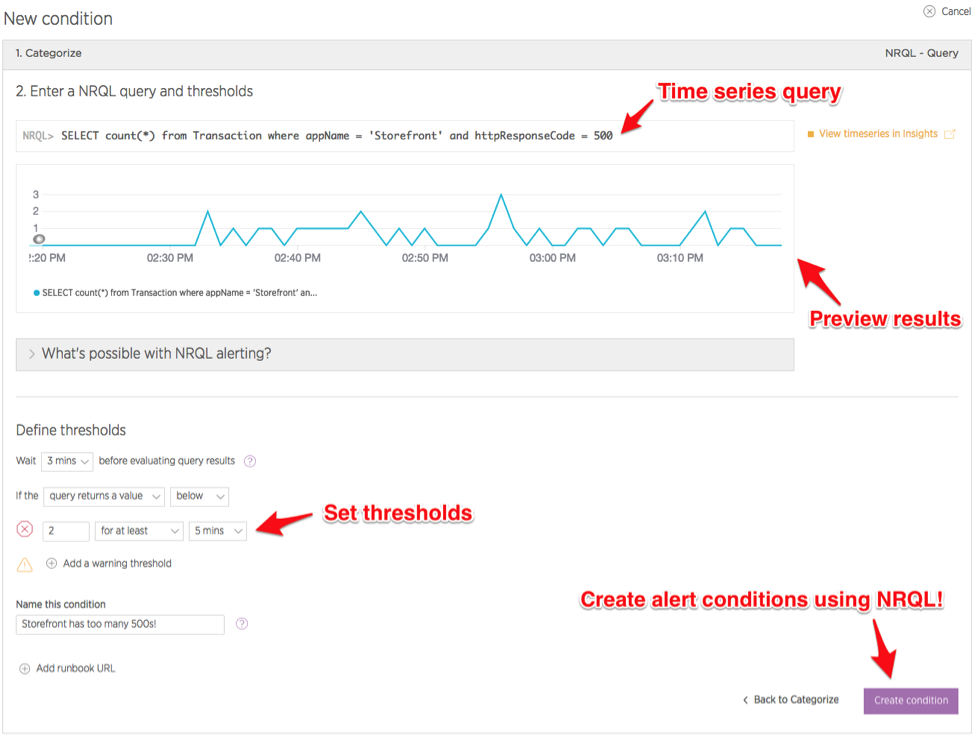New Relic Query Language (NRQL), pronounced “nerkel,” is the SQL-like language we have been developing since 2014 specifically for analytics. Our customers use NRQL extensively to write custom queries and analyze the data (both metric and events data) they send to New Relic.
Along the way we’ve received many requests to add alerting and notifications using data from NRQL queries. Following up on those requests, we announced NRQL alerts at our FutureStack16 user conference in San Francisco last year. Since then, hundreds of customers have participated in the limited-release beta program. They have not only given us great feedback but also demonstrated a plethora of game-changing use cases for NRQL alerting. That’s why I am so happy to announce that NRQL alerting capability is now generally available.
What are NRQL Alerts?
NRQL alerts are designed to offer the ability to create highly customized alerts using NRQL queries on the data you store in New Relic Insights and the New Relic database (NRDB). Now NRQL queries can be easily converted to alert conditions using the New Relic Alerts UI. The screenshots below show just how easy it is to use:


Why use NRQL alerts?
New Relic Alerts are designed to provide an easy-to-use, centralized UI to create alert conditions with full-stack visibility. Alert conditions can be easily created on a wide range of metric data collected from almost all New Relic products (including New Relic APM, New Relic Browser, New Relic Synthetics, New Relic Mobile, and New Relic Infrastructure) using the New Relic Alerts UI.
Now, in addition to operationalizing on metric data, NRQL alerts extend that capability to your event data stored in NRDB. This data can contain many dimensions, and NRQL lets you instantly slice and dice it to receive notifications when thresholds are met for the nuanced performance indicators that best represent system or business health.
One common use case for NRQL alerts is to alert off a group of things based on some shared criteria; for instance, if you want to trigger an alert any time checkout-related transactions have a duration longer than a particular threshold. The following NRQL query shows how easy it is:

Customers familiar with New Relic’s Key Transactions capability may be asking, “Isn’t that the same as a Key Transaction response time condition?” Yes, but with NRQL and the addition of a simple custom attribute like “username,” you can modify the query to notify you when a particular VIP customer had a bad experience with checkout:
The ability to arbitrarily filter and aggregate with a flexible analytics-focused query language (NRQL) opens the door to endless possibilities for ops and DevOps teams.
How can you use NRQL alerts?
Since NRQL alerts has been in limited-release beta, early users have been busy coming up with innovative ways to use it. Nate Heinrich recently wrote a description of how NRQL alerts works, and shared his “giant list of things you can do with this that might inspire you.” Read his post NRQL Alerts Will Change How You Think About Using New Relic Data to find more than a dozen examples of useful queries, including creating percentile-based queries on transaction data, so you don’t get swayed by misleading averages.
Where can I get more information?
For more information on NRQL alerts, refer to the create alert conditions for NRQL queries section of the New Relic documentation. And lots of great information on how to write NRQL queries can be found in the NRQL syntax, components, functions section of our documentation. Or, now that NRQL alerts is generally available, just go ahead and give it a try yourself!
Die in diesem Blog geäußerten Ansichten sind die des Autors und spiegeln nicht unbedingt die Ansichten von New Relic wider. Alle vom Autor angebotenen Lösungen sind umgebungsspezifisch und nicht Teil der kommerziellen Lösungen oder des Supports von New Relic. Bitte besuchen Sie uns exklusiv im Explorers Hub (discuss.newrelic.com) für Fragen und Unterstützung zu diesem Blogbeitrag. Dieser Blog kann Links zu Inhalten auf Websites Dritter enthalten. Durch die Bereitstellung solcher Links übernimmt, garantiert, genehmigt oder billigt New Relic die auf diesen Websites verfügbaren Informationen, Ansichten oder Produkte nicht.




